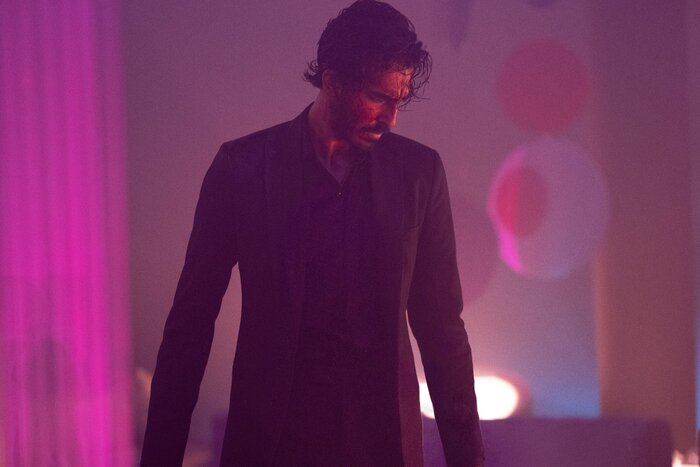Quentin Tarantino's "Once Upon a Time in Hollywood" trailer (courtesy of AD Matlon and Forum Film)
Just before his sixtieth birthday, the name of Quentin Tarantino's (apparently) last film as a director was revealed this month - "The Movie Critic".
The details of the plot are still unknown, apart from the time and place (Los Angeles, the seventies) and the fact that the film's protagonist is a woman.
All these have led many to the conclusion that the film will be based to some extent on the character of the legendary film critic Pauline Kyle.
And this is not the first time that the name of one of the greatest directors active today stands next to the name of the sharp-tongued and fearless critic.
The last time was in a completely different context.
The first non-fiction book written by the director, "Cinema Speculation", was published last November.
Kyle was mentioned in it as the one who inspired him to write the book, which is actually the first time that Tarantino has officially crossed the lines between making a movie and writing about it.
It is logical and even probable that the work on the book and the script were done at the same time, or at least influenced each other.
It is a collection of articles that combine criticism, film theory and the personal history of the director-writer.
No fewer than 900 films are mentioned in its 400 pages, 12 of which receive their own chapter - all American films from the seventies that the young Tarantino watched, including "Dirty Harry", "Men in the Trap" and "Taxi Driver".
"In addition to being one of the most respected contemporary filmmakers, Quentin Tarantino is probably the most infectiously enthusiastic film buff alive today."
Mazel Tov!
Quentin Tarantino (Photo: GettyImages)
Even before he started directing films himself, Tarantino made a name for himself in Los Angeles as an obsessive type with vast cinematic knowledge, such that it is worth asking him for recommendations.
He began gathering this broad knowledge at a very young age - one of his earliest memories is watching Westerns at the cinema with his grandmother, while his stepfather, Curtis Zastopil, took him to see adult films when he was in the single digits.
Years later, when he adapted the screenplay of Once Upon a Time in Hollywood into a book, Tarantino inserted the character of the stepfather into the story, somewhere between Margot Robbie's Sharon Tate and the fictional characters played by Leonardo DiCaprio and Brad Pitt.
Later, as a young film buff, he even gave up formal film studies and instead chose to work as an usher in a pornographic cinema and later as a seller in a video library, where he worked for five years.
As a director, Tarantino doesn't bother to hide his geeky side and his tendency to quote or actually copy from his favorite movies and genres.
In fact, he really revels in it - he challenges viewers to look for references, gestures or even restored goofs from past films in his work.
Each new film of his echoes other films, which his die-hard fans will rush to see to complete the puzzle.
According to him, "Great artists steal. They don't make gestures."
This sentence, by the way, is also a kind of gesture: it is a paraphrase of "Good artists copy. Great artists steal" - a famous quote by Pablo Picasso.
More in Walla!
10 weeks and swim half an hour rowing easily!
TI undertake!
Served on behalf of TI SWIM
Life as a quote
In Tarantino's inner world, films from "inferior" genres - cheap horror films, dark thrillers and crazy action - live in peace and harmony alongside the greatest and most appreciated classics in the history of cinema.
The love for cinema in particular and popular culture in general permeates all layers of his films, from characters who quote dialogues from other works through movie posters that suddenly appear in the set and scenes that are recreated in their entirety to characters that mention specific movies by name or talk about movies, pop songs or TV series.
Take Kill Bill for example.
The two films under this name - Tarantino counts them together as one film - are packed with references to everything that follows: "Citizen Kane", "The Searchers" by John Ford, "Star Trek II: The Wrath of Khan", the Japanese film series "Lone Wolf and Cub", Charlie Brown from "Snoopy" and countless martial arts films.
When she arrives to confront her old nemesis, the kimono-clad O'Ran, Beatrice Kidd, the bride, wears a yellow suit worn by Bruce Lee in his last film, The Game of Death.
The reunion between them opens with a melody composed by Ennio Marricone for the movie "Death Rides a Horse", a meeting after which Beatrice eliminates all of O'Ren's retinue of warriors, wearing masks identical to that of the sidekick Kaito from the series "The Green Wasp", played, of course, by Bruce Lee.
The fight progresses through a series of shenanigans and actions that have previously appeared in movies that Tarantino loves: a choke attempt from "Deep Red,"
The dissection of a corpse from "Ichi The Killer", the battle between the silhouettes from "Samurai Fiction" or a whip of bleeding eyes from "City Of The Living Dead".
The main victim / source of inspiration is a Japanese action thriller from the seventies called "Lady Snowblood", which is quoted throughout the film and especially in the final battle between O'Ren and Beatrice.
A few more selected examples: the plot of "Kelbi Asmurat" is very similar to that of the Hong Kong-made thriller "City on Fire", which Tarantino praised and mentioned as a source of inspiration for him.
One of the murder scenes in "Cheap Literature" was borrowed from a scene in the movie "The Good, the Bad and the Ugly", while Bruce Willis' character in the movie draws inspiration from the hero of the movie "Beach Shores".
The film "Jackie Brown" is based on a book in which the character's name is Jackie Burke, but her name was changed in the film as a tribute to the main actress in it, Pam Greer, who is also known as the star of the blaxploitation film "Foxy Brown".
And we haven't even talked about "Django Unstoppable", which already in its name salutes the Spaghetti Western from 1966, and along the way brings the star of the original film for a brief guest appearance.
The most beautiful gesture.
Margot Robbie as Sharon Tate from "Once Upon a Time in Hollywood" (Photo: Forum Film)
And there are also the moments when the characters themselves watch TV or the cinema.
The frame in which fading star Rick Dalton enthusiastically points at the television has already become an Internet meme, but the most beautiful tribute to the experience of watching Once Upon a Time in Hollywood is the scene in which actress Sharon Tate, that is, Margot Robbie as Sharon Tate, visits a random movie theater in Los Angeles To watch a movie by Sharon Tate (the real one) - and is delighted to hear the audience laughing and enjoying her performance.
It is a beautiful tribute to an actress whose life was cut short prematurely and with unimaginable cruelty, as later in the film Tarantino uses the power of cinema to create a different, better fate for her.
This is also what he does in "Dishonorable Bastards" to give a young Jewish woman an imagined and perfect revenge on the Nazi party leaders: Shoshana, whose family was murdered by the "Jew hunter" Hans Landa at the beginning of the film,
Turns her Parisian movie theater - of all places - into a bloodbath when she sets it on fire with all its occupants during a screening of a Nazi propaganda film.
On the way, she appears on the screen with a visible face - so large and menacing that it strikes terror even in the heart of Adolf Hitler.
"The crazy old man from the cinema"
Arguably, this dual identity of filmmaker and film fan is one of the many influences Tarantino drew from French New Wave directors such as Francois Truffaut and Jean-Luc Godard.
The French New Wave grew out of the mythical magazine "The Notebooks of Cinema", with directors who began their professional careers as film critics who watched, analyzed and delved into cinematic works with the same seriousness that was invested until then in "higher" arts, such as literature and theater.
As writers they tried to challenge the definitions of "masterpieces" or high and low, and as creators they broke artistic conventions with the same enthusiasm and drew their main inspiration from the filmmakers who preceded them.
It's hard to say that Tarantino's films are similar to theirs, but something about their approach stuck with him and influenced him, even when he went from small indie films to huge Hollywood productions.
As a bonus, the production company Tarantino founded in 1991 he called A Band Apart, a pun on Godard's film Bande à part.
Like any self-respecting obsessive movie fan, Tarantino also has a podcast.
Last year, a joint podcast of him and Richard Abari, a long-time colleague, went live - "The Video Archives Podcast", as the name of the video library in which they worked together.
In the program, they return to the films they watched together in their youth - blockbusters, critics' favorites and also particularly forgotten titles.
The podcast and the book together give a decent idea of the director's taste and the recommendations you would have received from him if you had met him in the 1980s, but it is not uncommon to also receive new recommendations on new films from him.
Thus, for example, he titled the Israeli film "Who's Afraid of the Bad Wolf?"
for his film of the year in 2013, and recently we received an unequivocal praise from him for "Love in the Sky: Maverick": "It was fantastic, a cinematic spectacle of the kind that I almost thought I would never get to see again. It was fantastic."
It's hard not to wonder - when Tarantino declares that he watched "Maverick" on the cinema screen, was it by chance in some theater in the Planet or Cinema City chain?
It is no longer so rare to catch the great director at a screening of a local movie theater, as happened not long ago in the tribute we organized at the Tel Aviv Cinematheque to Gialo, the horror and suspense genre that emerged in Italy in the 60s and 70s.
It's still unclear how serious Tarantino is about his promises to retire after 10 films, but a short quote from an interview he gave in 2005 hints at what he may be planning next: "My plan is to open a movie theater in some small town and run it. I'll be the crazy old man from the movies." .
Soon in Kiryat Shmona or Rehovot?
culture
Theater
Tags
Quentin Tarantino
Kill Bill
pulp Fiction
custody dogs
Django Unchained
There were times in Hollywood
The Hateful Eight


/cloudfront-eu-central-1.images.arcpublishing.com/prisa/UMZUGGCGNJAGND4LB6EASH35GQ.png)


/cloudfront-eu-central-1.images.arcpublishing.com/prisa/S6ARYN3A4ZF23EJ2KLKXTSQGII.jpg)







